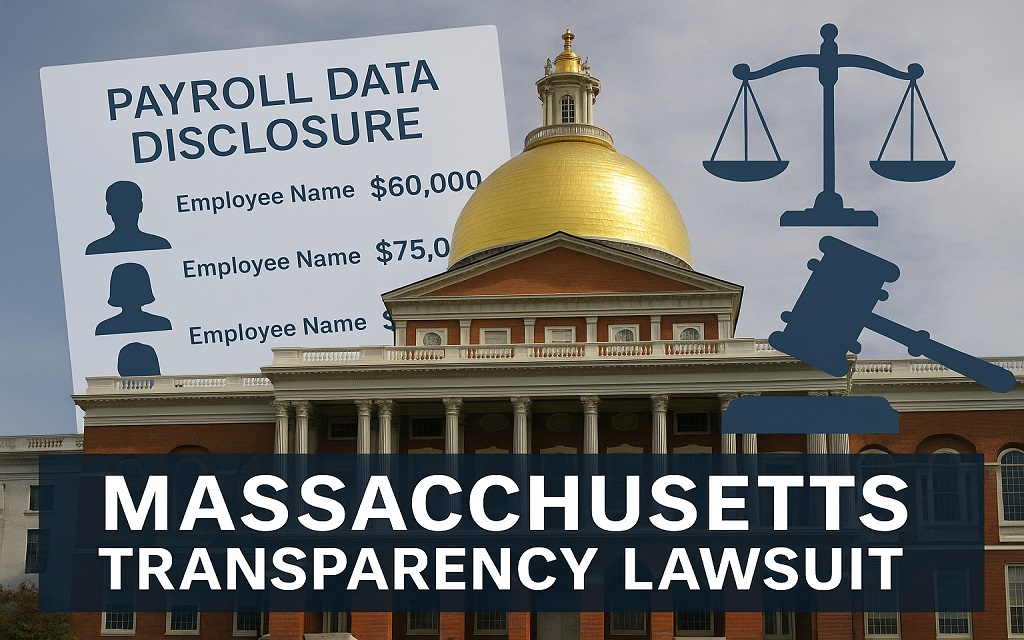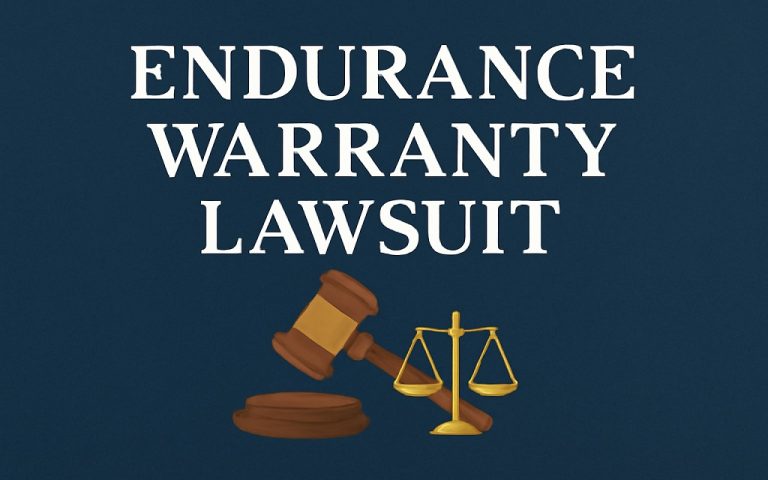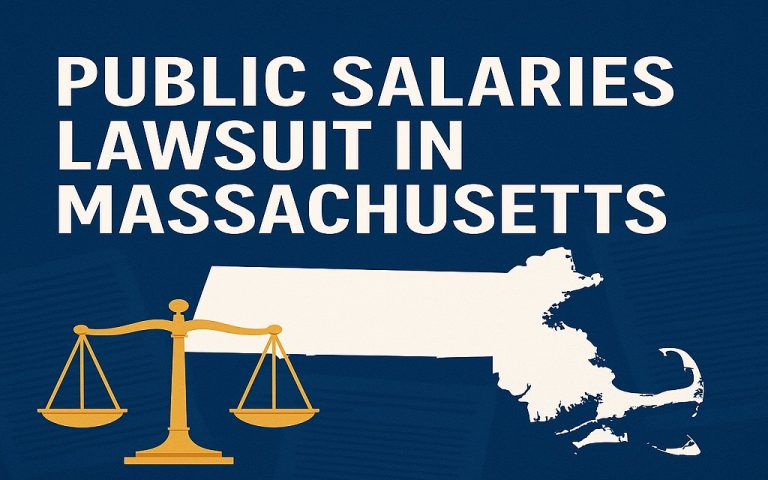Massachusetts finds itself at the center of a growing legal debate. The Open Payroll Massachusetts lawsuit raises questions about salary transparency, public data access, and potential misuse of state employee information. This case draws attention from government watchdogs, privacy advocates, and citizens alike.
The Open Payroll Massachusetts lawsuit reshapes how the public and government think about transparency. In the digital era, the fundamental issue is between employee privacy and taxpayer rights. The CTHRU payroll system, which makes the identities and wages of state employees publicly available, has drawn criticism from Massachusetts, a state renowned for its progressive administration.
This legal action, initiated by employees, questions whether this openness has gone too far. The outcome may set legal precedent for Massachusetts and public records policy across the United States.
Understanding the lawsuit helps uncover how open payroll systems function, what sparked legal action, and how it could impact future data handling in Massachusetts.
What Is Open Payroll in Massachusetts?
State workers have unrestricted access to payroll records through the Massachusetts Office of the Comptroller’s CTHRU portal. The portal was first introduced in 2016 to promote fiscal accountability and transparency by allowing the general public to follow governmental pay spending.
Data available includes:
- Full names of employees
- Job titles and departments
- Base pay and overtime
- Total annual compensation
This data is accessible without restriction. Anyone can download spreadsheets containing detailed salary records, updated annually. While the system was intended to serve transparency, plaintiffs now argue that it lacks guardrails to protect employee safety and dignity.
Overview of the Lawsuit
The plaintiffs, who include administrative employees, mental health professionals, and correctional officers, claim that the CTHRU portal infringes upon their constitutional rights. The action, which was filed in Suffolk Superior Court, claims that revealing names and precise incomes online without permission violates their right to privacy and leaves them vulnerable to harassment, reprisal, or worse.
Their legal team cites:
- The Massachusetts Declaration of Rights
- Federal privacy law interpretations
- Cases where public employee disclosures led to real-world threats
The case is built around the idea that public employees, especially those in sensitive roles, should not be involuntarily exposed simply because their salaries are tax-funded.
Who Filed the Lawsuit?
The plaintiffs include individuals from state correctional institutions, Department of Mental Health clinics, and regulatory agencies. Many of them work in roles where public exposure could lead to targeted attacks, either digitally or physically.
Their concern isn’t hypothetical. Some plaintiffs experienced doxxing, email phishing attempts, and hostile confrontations after the public saw their salaries. One therapist shared in court filings that a patient used her salary as a pretext for abuse during a session.
Their attorneys seek an injunction that would:
- Remove names from the portal
- Limit salary data to ranges
- Allow opt-outs for specific roles
Their legal team includes privacy law specialists and union representatives, amplifying the reach and complexity of the case.
Massachusetts Government’s Position
State officials argue that the lawsuit threatens long-standing public records laws. Under the Massachusetts Public Records Law (M.G.L. c. 66), most government financial records must remain accessible. The Comptroller’s Office maintains that taxpayer money requires transparent oversight and that salary data qualifies as non-sensitive information.
They claim:
- The public has a right to know how funds are spent
- Salaries are not protected under privacy exemptions
- No sensitive personal identifiers (e.g., Social Security numbers) are exposed
Their legal briefs also note that other states—including California, Texas, and New York—operate similar portals, reinforcing the practice’s legitimacy.
How to Track This Lawsuit
You can follow case updates through:
- Massachusetts court records online
- News sections on government transparency sites
- Legal blogs tracking public record disputes
- Official statements from the Office of the Comptroller
Public hearings and judicial orders will shape future transparency rules.
Transparency vs. Privacy: Legal Implications
This lawsuit challenges the legal boundaries of open data. Historically, courts have ruled in favor of transparency, especially with financial disclosures. But evolving interpretations of privacy law now put that standard to the test.
Key legal concepts in play:
- Public interest doctrine (does the public benefit outweigh individual harm?)
- Reasonable expectation of privacy
- Digital amplification (how online publication changes privacy risks)
If the court sides with the plaintiffs, it may limit what counts as “public record” in the digital age. This could redefine how governments balance transparency and personal security.
Impact on Public Records Access
Massachusetts is a bellwether. If this lawsuit succeeds, other states may follow its lead. A ruling in favor of the plaintiffs could lead to:
- Redacted salary disclosures (names removed)
- Salary bands instead of exact numbers
- Access is only for journalists or watchdog groups
States may also be forced to introduce two-tiered systems—one for general public access and another for credentialed users who require justification.
This would radically change how public accountability is enforced nationwide.
Critics Say the Lawsuit Threatens Transparency
Transparency advocates argue that the lawsuit could roll back decades of progress. Open payroll data exposes:
- Government bloat
- Overcompensation in the public sector
- Systemic inequities like gender pay gaps
Groups like the Massachusetts Fiscal Alliance and CommonWealth Beacon have published op-eds supporting the CTHRU model. They believe that hiding salary data makes it easier to mismanage or misappropriate public funds.
Public Sector Union Reactions
Labor unions remain divided. Some, like AFSCME Council 93, demand greater safeguards and opt-outs. Others, such as the Massachusetts Teachers Association, warn that public scrutiny can erode solidarity and lead to division among workers. The Massachusetts Nurses Association (MNA) and SEIU Local 888 issued joint statements expressing concerns about digital exposure. They argue that open payroll data can weaken collective bargaining power.
Key union concerns:
- Weakening collective bargaining
- Peer resentment over exposed pay differences
- Increased tension during contract negotiations
Union leaders also cite the possibility that the public’s misinterpretation of data could result in a backlash against workers rather than their employers.
Legal Precedents in Other States
- California (2015): The Court ruled that UC employee salaries must be public, even for high-ranking faculty and deans.
- Illinois (2021): Ruling allowed Chicago police officers to mask their identities in public databases after doxxing incidents.
- Florida (2019): The public employee salary site was temporarily taken offline after multiple phishing attacks were traced back to database access.
- Ohio (2022): The case limited the disclosure of police officer data after officers received threats due to online databases. The court ruled that context and safety concerns can override transparency in specific roles.
These cases suggest that courts increasingly consider occupational sensitivity and risk of harm when evaluating salary disclosures.
Legal experts suggest the Massachusetts court will likely consider:
- Role sensitivity (law enforcement, corrections, mental health)
- Scope of public interest
- Technological amplification of data risks
This means the court may order partial restrictions rather than a complete takedown of payroll transparency.
Cybersecurity and Data Misuse
Open data isn’t just about public access—it also exposes vulnerabilities. CTHRU does not require login or bot-checking, making it susceptible to:
- Data scraping
- Name harvesting
- Cross-site profiling
Hackers can combine names with LinkedIn, Facebook, or other public records to build employee profiles. This lawsuit argues that the state’s lack of cyber hygiene intensifies risk.
As part of the discovery, the plaintiffs’ legal team requested security audits of the portal and data download logs, though the state pushed back, citing budget limitations.
First Amendment vs. Government Transparency
A novel argument in the case involves the First Amendment. Plaintiffs argue that forced exposure of salaries can chill free speech and collective advocacy. If employees fear retribution based on publicized income, they may:
- Avoid protests or union activity
- Decline media interviews
- Feel silenced by public scrutiny
Legal scholars call this the “transparency paradox,” where openness begins to suppress the very freedoms it was meant to protect.
Timeline and Key Legal Developments
Legal action against the Massachusetts CTHRU portal began in early 2024. A coalition of public employees first sent a demand letter to the Office of the Comptroller requesting the removal of their names and detailed compensation data. When the request was denied, the group filed suit in Suffolk Superior Court.
Timeline highlights include:
- January 2024: Formal complaint filed by plaintiffs
- March 2024: The State filed a motion to dismiss
- June 2024: Judge denied dismissal, citing potential privacy harm
- October 2024: The Discovery phase began, with depositions from Comptroller officials
- January 2025: Hearings on First Amendment and privacy claims held
The following ruling, expected mid-2025, could clarify whether salary databases constitute protected public records or infringe on employee rights.
Public Interest vs. Individual Exposure
The state contends that public interest in payroll transparency is paramount. However, the plaintiffs argue that exposing individual data serves no clear purpose when anonymized data could offer similar insights.
Questions arise:
- Does the public benefit from knowing who earns what?
- Or can aggregate statistics meet the same transparency goals?
The court must decide whether individual identification is essential or gratuitous.
How This Lawsuit Affects State Employees
Public workers may see better control over sharing salary data if the court sides with plaintiffs.
Potential protections could include:
- Ability to mask personal identifiers
- Use of employee ID numbers instead of names
- Annual review of database security practices
State unions have started pushing for more digital safeguards regardless of the case’s outcome.
Future of Open Government Databases
This case could change how transparency tools function nationwide. Reforms already being considered include:
- Tiered user access
- Data suppression for at-risk roles
- Dynamic consent models for employees
Tech and legal experts propose blockchain-based tracking to monitor who accesses salary data, and API-level restrictions to prevent scraping.
Conclusion: A Defining Case for Digital Privacy in Government
The Open Payroll Massachusetts lawsuit goes far beyond state borders. It raises fundamental questions about digital privacy, constitutional rights, and government accountability.
The Open Payroll Massachusetts lawsuit is a significant legal milestone. It tests how states should balance transparency against rising concerns over digital privacy. This lawsuit could reshape how Massachusetts handles payroll data and how every state approaches public records.
As the court deliberates, states across the country wait for guidance on ethically, securely, and lawfully managing open payroll systems.
This case could define the next chapter in American transparency law.
FAQs
What is the Open Payroll Massachusetts lawsuit about?
It challenges the legality of publishing full names and salaries of public employees on the state’s CTHRU portal, citing privacy violations.
Why are state employees suing over payroll transparency?
They argue that the data exposes them to harassment, cyber threats, and violates their constitutional rights to privacy and safety.
Is salary information considered public record in Massachusetts?
Yes, salary data is public under the Massachusetts Public Records Law. However, this lawsuit may redefine the limits of that law in digital contexts.
How does the lawsuit impact other states?
It could set a precedent for limiting open payroll portals across the U.S., especially in cases involving at-risk professions.
Will CTHRU be shut down if the lawsuit succeeds?
It’s not likely. The court may order modifications, such as redacting names or limiting access to specific roles or users.
Must Read: Paraquat Lawsuits: What You Need to Know About Settlements and Legal Action
Musarat Bano is a content writer for JudicialOcean.com who covers lawsuits, legal news, and general legal topics. Her work focuses on research-based, informational content developed from publicly available sources and is intended to support public awareness. She does not provide legal advice or professional legal services.




